How to Learn AI In Brief
- Article Type: AI learning guide
- Topic: How to learn AI from scratch
- Audience: Career-switchers, data/ML beginners, business professionals upskilling
- Includes: 12-month roadmap; prerequisites (Python, math, stats); ML & deep learning; tools (NumPy, pandas, scikit-learn, PyTorch/Keras, APIs); projects; ethics & MLOps; careers & certification
- Outcome: You build AI literacy, ship portfolio projects, and map a role (data scientist, ML engineer, researcher) or upskill your team.
How to Learn AI from scratch at a glance:
- Months 1–3: Python, linear algebra/probability, data manipulation.
- Months 4–6: Core ML, model building/validation, intro to DL.
- Months 7–9: Specialize (NLP/CV/AI for business), deploy projects, MLOps basics.
- Months 10+: Advance skills, follow research, ethics, contribute & certify.
AI has already started to change the world we live in. We now have access to artificial intelligence tools that are making certain areas of work and life faster and more productive. The pace of change is startling, making many more people want to learn AI.
We've already seen the importance of AI in The State of Data & AI Literacy Report 2025. We found that 69% of leaders believe that AI literacy is important for their teams' daily tasks. Professionals in all kinds of industries are using generative AI tools like ChatGPT, Midjourney, and Gemini to change their workflows. As such, the art and science of AI are more relevant today than ever before.
Whether you want to become a data scientist, a machine learning engineer, an AI researcher, or you're simply an AI enthusiast, this guide is for you. We'll cover how to learn AI from scratch and provide practical advice and tips from industry experts to help your learning journey. As well as covering the skills and tools you need to master, we'll also explore how businesses can use AI to be more productive.
Watch and learn more about the basics of AI in this video from our course.
TL;DR: How to Learn AI From Scratch in 2026
If you're short on time and want to know how to learn AI from scratch, check out our quick summary. Remember, learning AI takes time, but with the right plan, you can progress efficiently:
- Months 1-3: Build foundational skills in Python, math (linear algebra, probability, and statistics), and data manipulation.
- Months 4-6: Learn core AI concepts, including machine learning algorithms, model building, and deep learning basics.
- Months 7-9: Specialize in areas like NLP, computer vision, or AI for business. Work on real-world projects.
- Months 10+: Keep improving! Follow AI research, contribute to projects, and explore advanced topics like AI ethics and MLOps.
The rest of this guide provides the best resources, expert insights, and a structured plan to take you from beginner to AI practitioner in under a year.
What is Artificial Intelligence (AI)?
AI, or Artificial Intelligence, is a branch of computer science that focuses on creating systems that can perform tasks that would normally require human levels of intelligence. This includes things like understanding natural language, recognizing patterns, making decisions, and learning from experience. AI is a wide discipline with numerous subfields, each with unique objectives and specializations. We have a full guide, What is AI?, which covers this definition in more detail. You can also explore how AI is different from machine learning in a separate article.
AI Upskilling for Beginners
What are the different types of artificial intelligence?
You'll find that AI technology is discussed in various ways, with various acronyms and phrases. To help simplify the remainder of the article, it’s important to look at the main different types of AI. AI can be categorized into three levels based on its capabilities:
- Artificial Narrow Intelligence (ANI): This is the most common form of AI we interact with today. ANI is designed to perform a single task, like voice recognition or recommendations on streaming services.
- Artificial General Intelligence (AGI): An AI with AGI possesses the ability to understand, learn, adapt, and implement knowledge across a wide range of tasks at a human level. While large language models and tools such as ChatGPT have shown the ability to generalize across many tasks—as of early 2026, this is still a theoretical concept, although one that is certainly gaining more traction.
- Artificial Super Intelligence (ASI): The final level of AI, ASI, refers to a future scenario where AI surpasses human intelligence in nearly all economically valuable work. This concept, while intriguing, remains largely speculative.
The difference between data science, artificial intelligence, machine learning & deep learning
AI is a broad field with several subsets, including Machine Learning (ML) and Deep Learning (DL).
While there isn't an official definition for any of these terms, and while experts argue over the exact boundaries, there is a growing consensus on the broad scope of each term. Here’s a breakdown of these terms:
- Artificial intelligence refers to computer systems that can behave intelligently, reason, and learn like humans.
- Machine learning is a subset of artificial intelligence focused on developing algorithms with the ability to learn without explicitly being programmed.
- Deep learning is a subset of machine learning. It is responsible for many of the awe-inspiring news stories about AI in the news (e.g., self-driving cars, ChatGPT). Deep learning algorithms are inspired by the brain's structure and work exceptionally well with unstructured data such as images, videos, or text.
Data science is a cross-disciplinary field that uses all of the above, amongst other skills like data analysis, statistics, data visualization, and more, to get insight from data.
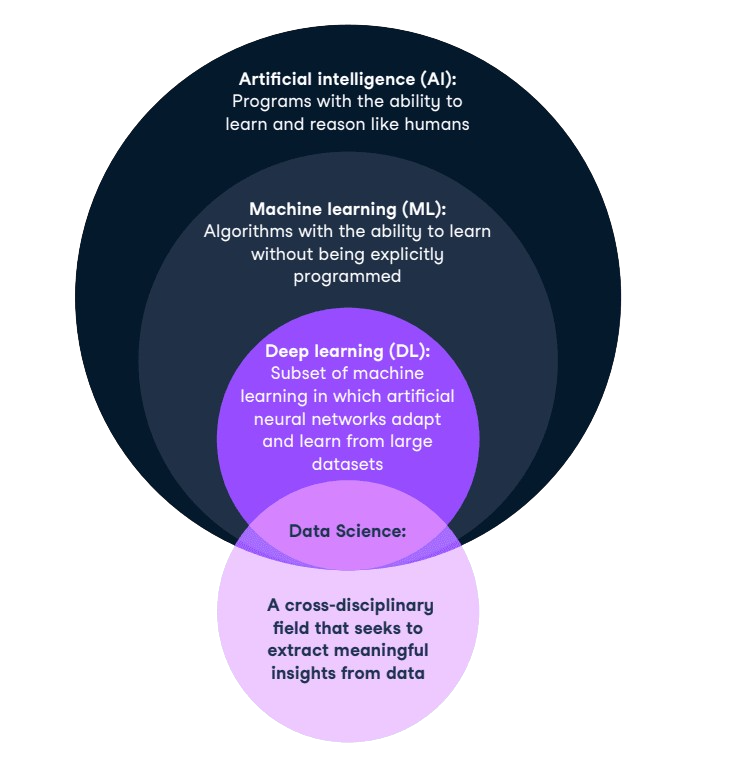
Why Should You Learn Artificial Intelligence in 2026?
Artificial Intelligence is more than just a buzzword; it's a revolutionary technology changing how we work, live, and interact. With the explosion of data and the need to make sense of it, the demand for AI skills is skyrocketing in so many fields. There's no better time than now to start learning AI. Here's why:
AI is a fast-growing field
Artificial Intelligence isn't the future; it's the present. The number of AI jobs has seen significant growth over recent years. According to the World Economic Forum’s Future of Jobs report, AI and machine learning specialists top the list of fast-growing jobs over the next five years. As industries continue to adopt AI technologies to streamline their operations and make better decisions, the demand for AI specialists will likely only increase.
Statista statistics project considerable AI market size growth, further emphasizing this point. They estimate that the market size in Artificial Intelligence will reach US$320.13bn in 2026 and US$826.73bn by 2030.
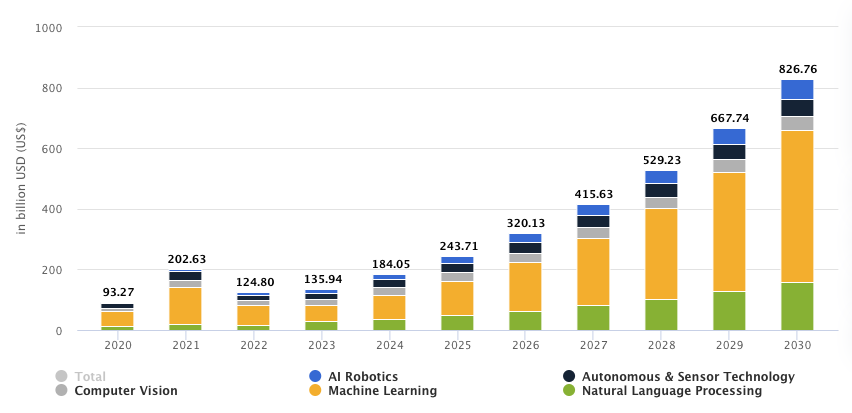
AI is a high-paying job
Naturally, the surge in demand for AI skills comes with attractive compensation. According to data from Glassdoor, as of December 2025, the average salary of an AI engineer in the United States is $140,000 per annum, with the potential for bonuses and profit sharing. Machine learning engineers and data scientists are similarly well-paid, with average salaries of $124,000 per year and $150,000 per annum, respectively. This financial compensation reflects the value and impact of AI skills in the marketplace.
You can read our guide about how to become an AI engineer to learn more about this exciting and rapidly developing career.
AI is intellectually challenging
Artificial Intelligence is not just about high-paying jobs and significant market demand. It's also an intellectually stimulating field that promises to challenge you in exciting ways. It involves building algorithms to solve complex problems, designing models that simulate human intelligence, and creatively applying these technologies to various real-world scenarios.
AI professionals continuously learn, adapt, and innovate. The field is constantly evolving, meaning there's always something new to learn, a problem to solve, or a system to improve. This dynamic nature makes AI an exciting field for those who thrive on challenges and continuous learning.
How Long Does it Take to Learn AI?
The time it takes to learn AI will often depend on the route you take; whether it's self-taught or through formal education such as a university program.
In a self-taught route, the duration can vary significantly as it largely depends on your prior knowledge, dedication, and available learning resources. It can take several months to a year or more to gain a solid understanding of AI concepts, programming languages such as Python, mathematics, and various machine learning algorithms through self-study. Self-paced online courses, tutorials, and practical projects can accelerate the learning process.
On the other hand, a university route typically involves pursuing a formal education in computer science, data science, or related fields. A bachelor's degree in these disciplines typically takes around three to four years to complete, during which students receive comprehensive training in AI and related subjects.
Whichever route you choose, continuous learning, practical application, and staying up-to-date with advancements are essential for pursuing a career in AI.
How to Learn AI From Scratch in 2026
Learning AI can be an exciting endeavor, but it’s not without its challenges. It’s a broad field with many subtopics. However, with a clear roadmap, the right resources, and a strategic approach, you can navigate this landscape effectively. Here’s how to learn AI in 2026:
1. Master the prerequisite skills
Succeeding in AI requires mastery of three critical areas:
- Mathematics: AI relies heavily on mathematical concepts, particularly its subfields like machine learning and deep learning. Of course, you don't have to be a mathematician to succeed in AI, but a basic understanding of linear algebra, calculus, and probability is essential. For instance, concepts such as matrices and linear transformations from linear algebra are frequently used in AI algorithms.
- Basic statistics: AI makes a lot of sense when you understand statistics. Knowing how to interpret data and derive insights is crucial in this field. Concepts like statistical significance, distribution, regression, and likelihood play a significant role in different AI applications.
- A willingness to learn: AI is a rapidly evolving field with new advancements, techniques, and tools constantly emerging. Therefore, a proactive mindset and an enthusiasm for learning and adapting to new knowledge and technologies are pivotal for anyone looking to break into and advance in AI.
It's important to note that the depth of understanding and mastery required in these prerequisite areas can vary depending on the AI role you aim to pursue. For instance, a data scientist might not need an in-depth understanding of every mathematical concept used in AI, but a research scientist aiming to create new AI algorithms might need a more profound grasp of mathematics.
The key is to align your learning path with your career goals and adjust the depth of your learning in different areas accordingly.
2. Develop specialist AI skills
Now that we've covered the prerequisites, let's delve into the essential skills you need to develop to master AI. Similar to the prerequisite section above—the level of mastery you’ll need for these skills largely depends on what type of role you wish to pursue.
Statistics
Statistics is the discipline that concerns the collection, organization, analysis, interpretation, and presentation of data. It provides the backbone for understanding and working with data in AI.
Learn more about statistics in the resources below:
- Statistics Fundamentals with Python Skill Track, where you'll learn the four fundamentals of statistics using Python, including summary statistics and probability, statistical models such as linear and logistic regression, techniques for sampling, how to perform hypothesis tests, and draw conclusions from a wide variety of data sets.
- Introduction to Statistics Course, which teaches the fundamentals of statistics, including measures of center and spread, probability distributions, and hypothesis testing.
- Introduction to Statistics in R Course, for learning how to work with variables, plotting, and standard deviation in R.
Mathematics
As discussed earlier, certain areas of mathematics form the foundation of AI algorithms. Linear algebra, calculus, probability, and differential equations are all mathematical tools that will be used in your AI journey.
Learn more about mathematics in the resources below:
- Demystifying Mathematical Concepts for Deep Learning, which explores the basic math concepts for data science and deep learning.
- Linear Algebra for Data Science in R Course, where you’ll cover the basics of linear algebra, including how to use matrix-vector equations, perform eigenvalue/eigenvector analyses, and PCA.
- Foundations of Probability in Python Course covers the fundamental probability concepts like random variables, mean and variance, and more.
Programming
AI implementation requires a sound understanding of programming. Knowing how to write code allows you to develop AI algorithms, manipulate data, and use AI tools and libraries. Python is currently the most popular language in the AI community due to its simplicity, flexibility, and availability of data science libraries.
- Python Programming Skill Track will help you improve your Python programming skills. You’ll learn how to optimize code, write functions and unit tests, and use software engineering best practices.
- R Programming Skill Track, similarly, here you’ll level up your R programming skills by learning how to work with common data structures, optimize code, and write your own functions.
Data structures
Data structures allow you to store, retrieve, and efficiently manipulate data. Therefore, knowledge of data structures like arrays, trees, lists, and queues is essential for writing efficient code and developing complex AI algorithms.
- Introduction to Data Structures and Algorithms Course will help you understand data structures such as linked lists, stacks, queues, hash tables, and graphs.
- Python Data Structures with Primitive & Non-Primitive Examples Tutorial covers Python data structures, such as data types, and primitive and non-primitive data structures, such as strings, lists, stacks, and more.
Data manipulation
Data manipulation involves cleaning, transforming, and manipulating data to prepare it for further analysis or feeding it into AI models. Skills in using libraries like pandas for data manipulation are essential for working in AI.
- Data Manipulation with Python Skill Track, which teaches how to transform, sort, and filter data in DataFrames in Python, ready for quick analysis.
- Data Manipulation with R Skill Track, which covers the above approach but in the R programming language.
- Data Manipulation with pandas Course teaches you how to manipulate DataFrames with pandas as you extract, filter, and transform real-world datasets for analysis.
Data science
Data Science is a blend of various tools, algorithms, and machine learning principles aimed at discovering hidden patterns from raw data. As an AI professional, understanding the process of extracting insights from data is crucial.
- Data Scientist with Python Career Track, which covers the Python skills needed to succeed as a data scientist.
- Data Scientist with R Career Track, which covers the R Programming skills needed to succeed as a data scientist.
- Understanding Data Science Course, covers the basics of what data science is and why it matters.
Machine learning
Machine learning is a subfield of AI where machines learn from data to improve their performance or make accurate predictions. It's essential to understand different machine learning algorithms, how they work, and when to use them.
- Machine Learning Fundamentals with Python Skill Track, teaches you the machine learning fundamentals and the science behind it, covering prediction, pattern recognition, and the deep learning basics.
- Machine Learning Fundamentals in R Skill Track, where you’ll learn to predict categorical and numeric responses via classification and regression, and discover the hidden structure of datasets with unsupervised learning.
- Machine Learning Cheat Sheet, which is a quick reference guide for the top machine learning algorithms, their advantages and disadvantages, and use-cases.
Deep learning
Deep learning, a subset of machine learning, uses neural networks with multiple layers (hence 'deep') to model and understand complex patterns in datasets. It's behind many of the most advanced AI applications today, from voice assistants to self-driving cars.
- Deep Learning in Python Skill Track, where you’ll learn to use the powerful Keras, TensorFlow, and PyTorch libraries to create and optimize neural networks.
- What is Deep Learning Tutorial, covering the most frequently asked questions about deep learning and explores various aspects of deep learning with real-life examples
- Introduction to Deep Learning with Keras Course, where you’ll learn how to develop your own deep learning models with Keras.
Each of these skills interconnects with the others, helping you build a broad knowledge of AI concepts. A good way to start is to gain the foundations in each area before exploring the ones that interest you most in more detail. You can blend your approach as you see fit, working on the areas that naturally come up as you study and gain hands-on practice.
3. Learn the essential AI tools and packages
Knowing the right tools and packages is crucial to your success in AI. In particular, Python and R have emerged as the leading languages in the AI community due to their simplicity, flexibility, and the availability of robust libraries and frameworks. While you don’t need to learn both to succeed in AI, below you will find some key libraries and frameworks you need to get familiar with depending on the tool you end up choosing:
Top Python AI tools and packages
Python is a high-level, interpreted programming language known for its readability and versatility. It is widely used in AI thanks to its user-friendly syntax and the plethora of libraries and frameworks available for AI and data science.
pandas
pandas is a Python library that provides extensive means for data analysis. Data scientists use pandas for various tasks, including data cleaning, data transformation, and statistical analysis. It works well with incomplete, messy, and unlabeled data, making it a significant tool for preprocessing datasets.
- Data Manipulation with pandas Course
- Writing Efficient Code with pandas Course
- Python pandas Tutorial: The Ultimate Guide for Beginners
NumPy
NumPy, short for Numerical Python, is a library for Python that adds support for large, multi-dimensional arrays and matrices, along with a large collection of high-level mathematical functions to operate on these arrays. It’s an essential library for any scientific computation, including AI.
Scikit-Learn
Scikit-Learn is a simple and efficient tool for data mining and machine learning. It is built on NumPy, SciPy, and matplotlib, and it's open-source, meaning it's freely available to everyone. It features various classification, regression, clustering, and dimensionality reduction algorithms.
- Machine Learning with Scikit-Learn Course
- Supervised Learning with Scikit-Learn Course
- Python Machine Learning: Scikit-Learn Tutorial
PyCaret
PyCaret is a powerful Python library that simplifies the process of building and deploying artificial intelligence models, enabling users to efficiently explore, preprocess, train, tune, and compare multiple machine learning algorithms with just a few lines of code.
PyTorch
PyTorch is an open-source machine learning library based on the Torch library. It’s used for applications such as natural language processing and artificial neural networks. Its biggest advantage is its flexibility and speed, making it suitable for deep learning research.
- How to Learn PyTorch Guide
- Deep Learning with PyTorch Course
- PyTorch Tutorial: Building a Simple Neural Network From Scratch
Keras
Keras is a user-friendly neural network library written in Python. It's built to minimize the time between your ideas and working models, offering a straightforward way for neural network modeling. Keras is also modular, making it incredibly versatile when constructing new models.
- Introduction to Deep Learning with Keras Course
- Keras Tutorial: Deep Learning in Python
- Keras Cheat Sheet: Neural Networks in Python
Commercially available APIs
Once you’re ready to start getting hands-on with AI, utilizing APIs to access commercially available models is one of the best ways to get started. Commercially available APIs such as the OpenAI API, Cohere API, and Anthropic API are good places to start.
- GPT-4o API Tutorial
- Using GPT-3.5 and GPT-4 via the OpenAI API in Python
- Working with the OpenAI API course
- A Beginner's Guide to the OpenAI API tutorial
- Mastering API Design tutorial
- OpenAI O1 API Tutorial: How to Connect to OpenAI's API
- Claude 3.7 Sonnet API Guide
- DeepSeek API Guide
Hugging Face
As your proficiency develops, explore pre-trained models using standard Python packages such as Hugging Face's transformers and accelerate, which make it easy to utilize GPUs and TPUs.
- What is Hugging Face?
- Working with Hugging Face course
- An Introduction to Using Transformers and Hugging Face
- Using Open Source AI Models with Hugging Face code-along
- Building NLP Applications with Hugging Face
- Hugging Face Smolagents guide
LangChain
One of the most popular AI frameworks at the moment in LangChain, which helps users to include AI from large language models inside data pipelines and applications.
- Introduction to LangChain for Data Engineering & Data Applications
- Developing LLM Applications with LangChain course
- How to Build LLM Applications with LangChain tutorial
- Building LangChain Agents to Automate Tasks in Python tutorial
LLaMA
Llama (Large Language Model Meta AI) is a family of open-source LLMs developed by Meta (formerly Facebook). It provides a powerful alternative to proprietary models like GPT-4o and Claude Sonnet, allowing researchers and developers to fine-tune and deploy AI models efficiently.
- Working with Llama 3 course
- Llama Fundamentals skill track
- Fine-tuning Llama 3.2 and Using it Locally guide
An Example AI Learning Plan
Below, we’ve created a potential learning plan outlining where to focus your time and efforts if you’re just starting out with AI. Remember, the timescales, subject areas, and progress all depend on a wide range of variables. We want to make this plan as hands-on and practical as possible, which is why we’ve recommended projects you can work on as you progress.
Month 1-3: Basics of mathematics, programming, data structures and manipulation
- Mathematics and statistics: Start with the basics of linear algebra, calculus, statistics, and probability. This will give you a strong foundation for what’s to come.
- Programming: Learn Python, the most widely used language in AI. Start with the basics and then move to more advanced concepts. Take our Python Fundamentals Skill Track and Data Manipulation with Python Skill Track to cover the essentials, including packages like NumPy.
- Data manipulation: Start learning about data manipulation and analysis. Get familiar with Python libraries like pandas and NumPy, which you’ll use for data manipulation. Learn how to clean and prepare data, which is a crucial part of any AI or machine learning project.
Recommend Resources & Projects
- Demystifying Mathematical Concepts for Deep Learning
- Python Fundamentals
- Exploring the History of Lego Data Science Project
- Understanding Artificial Intelligence Course
Month 4-6: Dive deeper into AI and machine learning
4. Basics of AI: Understand what AI is, its history, and its different branches. Courses like our Understanding Artificial Intelligence can provide a good start.
5. Deepen your machine learning knowledge: Learn about different types of machine learning algorithms - supervised, unsupervised, semi-supervised, and reinforcement learning. Take our Machine Learning Scientist with Python Track, which covers the most important model types, model validation, and hyperparameter tuning. It covers packages including TensorFlow and Keras and touches on advanced deep learning.
Recommend Resources & Projects
- Understanding Artificial Intelligence Course
- AI Fundamentals Skill Track
- Machine Learning Scientist with Python Career Track
- Naïve Bees: Image Loading and Processing Data Science Project
Month 7-9: Specialization and advanced topics
- Deep learning: Understand neural networks and deep learning.
- MLOps basics: Learn about MLOps, which is about applying DevOps principles to machine learning systems. This includes model versioning, model deployment, monitoring, and orchestration.
- Specialization: Based on your interests and career aspirations, specialize in one area - it could be natural language processing, computer vision, reinforcement learning, or any other field.
Recommend Resources & Projects
- Deep Learning in Python Skill Track
- MLOps Deployment and LifeCycling Course
- ASL Recognition with Deep Learning Data Science Project
Month 10-Ongoing: Keep learning and exploring
- Specialize further: Depedening on career paths
- Stay Up-to-date: Regularly follow AI-related blogs, podcasts, and journals. Join communities to exchange ideas with other AI practitioners.
- Ethics in AI: As you learn more about AI, be sure to also learn about the ethical considerations in AI.
Recommend Resources & Projects
Remember, this is just a basic roadmap. You should modify it based on your pace and interests. AI is a vast field, and learning is a continuous process.
Learn AI rodmap
Below, we've compiled the info from the learning path to visualize how to learn AI in 2026:
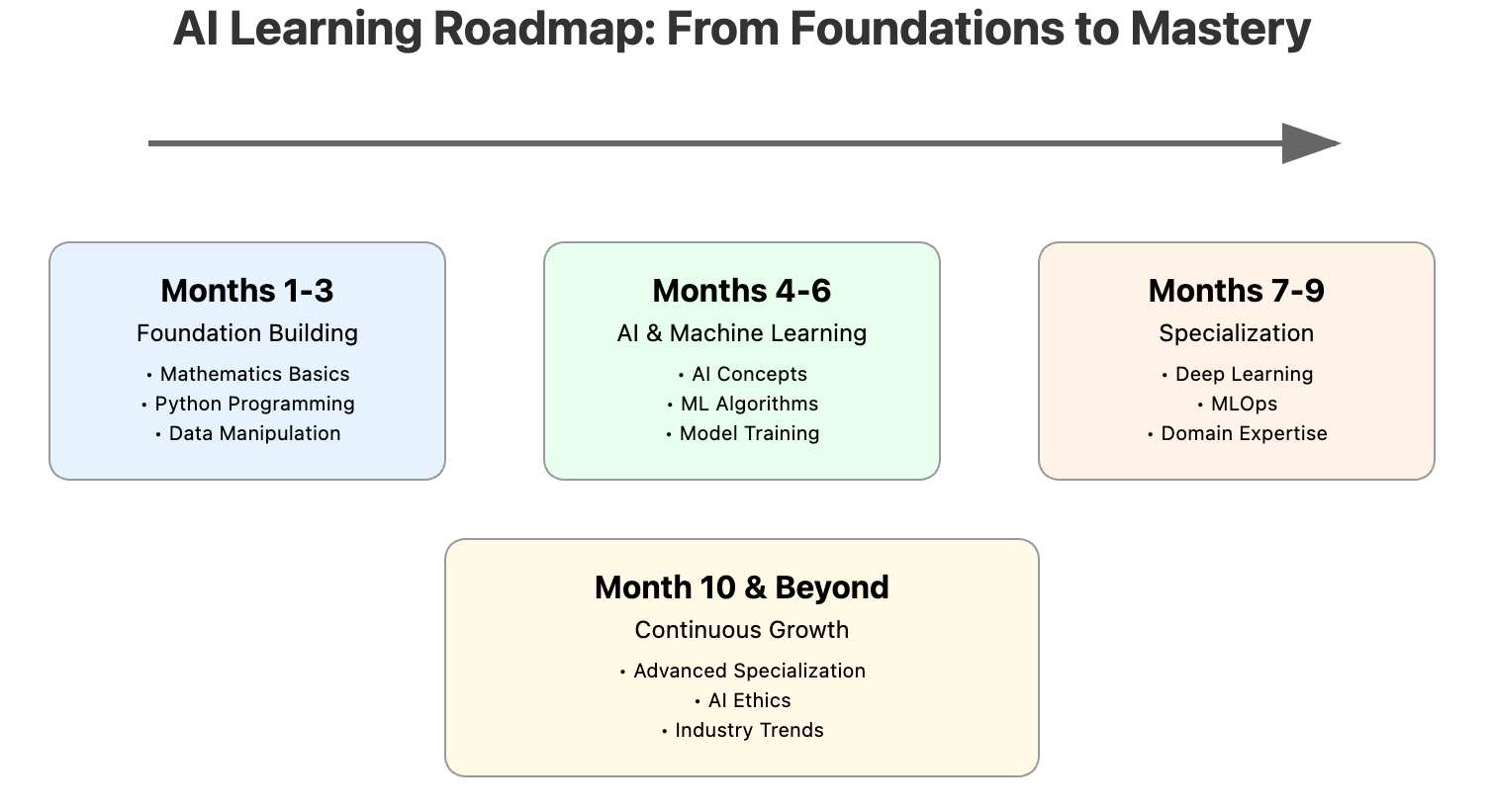
Top 5 Tips For Learning AI
Embarking on the journey to learn AI can be daunting, but having a strategic approach can make the process more structured and manageable. Here are five steps to guide you through your AI learning journey:
1. Choose your focus
Start by deciding where to focus your efforts based on your career goals. We discuss the various careers in AI further in this article; each role has a different focus and requires a unique skill set.
For example, if you're interested in a more applied role like a data scientist or machine learning engineer, focus more on programming, data science, and understanding various machine learning algorithms. Your aim here is to become proficient in using AI techniques to solve real-world problems.
Alternatively, if you're leaning towards a research role, you should delve deeper into the theory behind AI and machine learning. You'll need a solid grasp of mathematics, statistics, and theoretical computer science.
This is not a rigid distinction; rather, it’s a starting point to help you decide where to put your initial focus.
2. Start learning
Once you've decided on your focus, it's time to start learning. The learning resources suggested in the skills section and the AI learning plan above are useful places to start. Remember, mastering AI is a marathon, not a sprint. Take your time to understand each concept thoroughly before moving on to the next one.
3. Apply your skills to projects
There's no better way to learn than by doing. Applying the skills you learn in real-world projects solidifies your understanding and gives you practical experience that can enrich your portfolio. This could be as simple as creating a machine learning model to predict house prices or as complex as developing a deep learning model for image recognition. We’ve included example projects throughout this article.
4. Join a community
Join AI communities, both online and offline. Participating in forums like Stack Overflow or GitHub, joining AI groups on LinkedIn, or attending AI meetups and conferences can offer invaluable learning opportunities.
Once you’ve earned a DataCamp certification, you can join our DC Certified Community, where you can connect with other certified learners, access exclusive content and events, and make the most of your newly acquired skills.
By joining communities, you can stay updated with the latest trends, get help when you're stuck, and network with other AI enthusiasts.
5. Keep iterating
AI is a rapidly evolving field. Once you get the basics, it's important to keep learning and improving your skills. Follow AI blogs, read research papers, take advanced courses, and always be on the lookout for new ways to challenge yourself. This iterative process will turn you from a novice into an expert.
Remember, the journey to learning AI is challenging but immensely rewarding. Don't get discouraged if you encounter obstacles along the way; they're part of the learning process. Keep your end goal in mind, and stay committed to your journey.
The Best Ways to Learn AI in 2026
A rich abundance of resources is available to help you learn AI, from structured courses and textbooks to hands-on projects. Choosing the right resource can help you get off to a strong start with your AI learning. Here are our top picks to get you started on your AI learning journey:
Take the top AI courses to get started
DataCamp is a great platform that offers interactive courses specifically tailored for aspiring data scientists. The courses range from beginner to advanced levels and are designed with hands-on exercises. Here are some of the best AI-related courses on DataCamp:
- Understanding AI Course
- AI Fundamentals skill track
- Python Fundamentals
- Data Manipulation with Python
- Machine Learning Fundamentals with Python
- Machine Learning Scientist with Python
- Introduction to Deep Learning with PyTorch
Complete AI projects
Learning AI is a journey that goes beyond understanding theories and coding techniques. It involves hands-on practice, and this is where completing AI projects comes in.
Start by identifying a suitable project based on your proficiency level, be it a predictive model or a generative AI application. The right tools, such as Python and its extensive libraries, will be your cornerstone. Understanding and preparing your data is crucial, as it directly impacts your model's effectiveness.
Below are some ideas for AI projects you can build to help you on your way to AI mastery. Be sure to check out our articles on AI projects for all levels, NLP projects, generative AI projects and machine learning projects for all levels for further info.
- Classify Song Genres from Audio Data. Apply machine learning methods in Python to classify songs into genres.
- Naïve Bees: Image Loading and Processing. Work with image data, build classifiers using traditional techniques and leverage the power of deep learning for computer vision.
- ASL Recognition with Deep Learning. Build a convolutional neural network to classify images of letters from American Sign Language.
Read some of the best AI books
Books offer in-depth knowledge and insights from experts in the field. Here are some of the most influential books on AI that you might find helpful:
Remember, the key to learning AI is consistency and practice. Don't be afraid to start small and gradually work your way up to more complex concepts and projects. You'll be amazed at how much you can learn by dedicating just a little time each day to studying AI.
Check out the best AI cheat sheets
Our selection of data science cheat sheets can act as a quick reference guide on a wide variety of topics, including many related to AI:
- Python cheat sheet for beginners
- Supervised Machine Learning Cheat Sheet
- Unsupervised Machine Learning Cheat Sheet
- ChatGPT Cheat Sheet for Data Science
- The OpenAI API in Python
- The Generative AI Tools Landscape
- Deep Learning with PyTorch Cheat Sheet
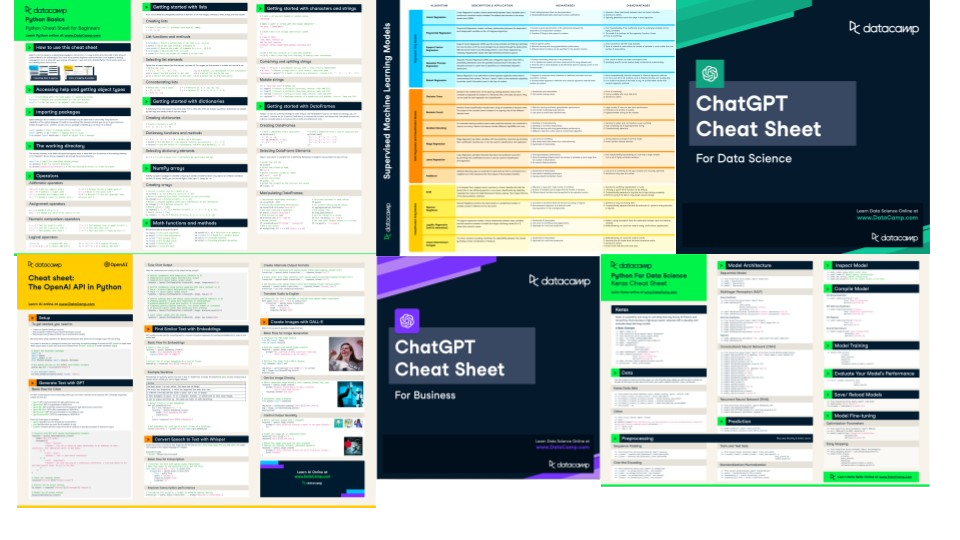
A collection of DataCamp Cheat Sheets
Get AI certified
As we explore in our guides on AI certification and generative AI certification, there are several ways you can get an industry-recognized certification that demonstrates your AI skills, including our own AI Fundamentals Certification. Going down the certification route can give you structure and a firm end goal, although it should always be part of a more comprehensive learning path.
The Different Careers in AI Today
Artificial intelligence has opened up numerous career paths, each with unique responsibilities, tools, and required skills. Let's delve into three AI careers that are popular at the moment: data scientists, machine learning engineers, and research scientists. Note that we will be mentioning some of the tools they need to master; if you are not familiar with these tools, that’s completely okay—we’ll be covering them in more detail in a later section.
Data scientist
Data scientists investigate, extract, and report meaningful insights into an organization's data. They communicate these insights to non-technical stakeholders and have a good understanding of machine learning workflows and how to tie them back to business applications. They work almost exclusively with coding tools, conduct analysis, and often work with big data tools.
Data scientists are the detectives of the data world, responsible for unearthing and interpreting rich data sources, managing large amounts of data, and merging data points to identify trends. They utilize their analytical, statistical, and programming skills to collect, analyze, and interpret large datasets. They then use this information to develop data-driven solutions to challenging business problems. A part of these solutions is developing machine learning algorithms that generate new insights (e.g., identifying customer segments), automate business processes (e.g., credit score prediction), or provide customers with new-found value (e.g., recommender systems).
Key skills:
- Strong knowledge of Python, R, and SQL
- Understanding of Machine Learning and AI concepts
- Proficiency in statistical analysis, quantitative analytics, and predictive modeling
- Data visualization and reporting techniques
- Effective communication and presentation skills
Essential tools:
- Data analysis tools (e.g., Pandas, NumPy)
- Machine learning libraries (e.g., Scikit-learn)
- Data visualization tools (e.g., Matplotlib, Tableau)
- Big data frameworks (e.g., Airflow, Spark)
- Command line tools (e.g., Git, Bash)
Machine learning engineer
Machine learning engineers are the architects of the AI world. They design and deploy machine learning systems that make predictions from organizations’ data. They also solve problems like predicting customer churn and lifetime value and are responsible for deploying models for the organization to use. Machine learning engineers usually work exclusively with coding-based tools.
Key Skills:
- Deep knowledge of Python, Java, and Scala
- Familiarity with machine learning frameworks (like Scikit-learn, Keras, or PyTorch)
- Understanding of data structures, data modeling, and software architecture
- Advanced mathematical skills (linear algebra, calculus, statistics)
- Ability to work in a team and exceptional problem-solving skills
Tools:
- Machine learning libraries and algorithms (e.g., Scikit-learn, TensorFlow)
- Data science libraries (e.g., Pandas, NumPy)
- Cloud platforms (e.g., AWS, Google Cloud Platform)
- Version control systems (e.g., Git)
Research scientists
Research scientists are the thinkers of the AI world. They conduct cutting-edge research to advance the state-of-the-art in AI. Their work often involves inventing new algorithms or improving existing ones. They also present their findings at AI conferences and in scholarly articles.
Key Skills:
- Solid understanding of machine learning and deep learning
- Proficiency in Python and other programming languages
- Extensive knowledge of AI-related mathematical theory (like statistical learning theory)
- Ability to conceptualize and validate novel AI models
- Strong writing and public speaking skills
Tools:
- Deep learning frameworks (like TensorFlow, PyTorch)
- Scientific computation tools (like MatLab, Mathematica)
- Software for writing and presenting (like LaTeX, Google Slides)
- Cloud computation resources (like AWS, Google Cloud Platform)
|
Data Scientist |
Machine Learning Engineer |
Research Scientists |
|
|
What is it? |
Extracts and reports meaningful insights from data to solve business problems. |
Designs and deploys machine learning systems to make predictions from data. |
Conducts research to advance the state-of-the-art in AI. Publishes findings. |
|
Key Skills |
Extracts and reports meaningful insights from data to solve business problems. |
Python, Java, Scala, ML Frameworks, Data Structures, Software Architecture, Mathematics, Teamwork, Problem-solving |
ML, Deep Learning, Programming, AI-related Math, Conceptualization, Writing, Public Speaking |
|
Tools |
Pandas, NumPy, Scikit-learn, Matplotlib, Tableau, Airflow, Spark, Git, Bash |
Scikit-learn, TensorFlow, Pandas, NumPy, AWS, Google Cloud Platform, Git |
TensorFlow, PyTorch, MatLab, Mathematica, LaTeX, Google Slides, AWS, Google Cloud Platform |
Each of these careers offers a unique path into the world of AI. They all hold tremendous potential and serve critical roles in the field. Your decision will depend on your interests, strengths, and long-term career goals.
How to Find a Job in AI
A degree can be a great asset when starting a career in AI, but it's not the only pathway. While we do think it’s worthwhile to get a formal education in AI or an adjacent field, more and more professionals are entering the field through non-traditional routes, proving that with dedication, consistent learning, and a proactive approach, you can land your dream job in AI.
Here's how to find a job in AI without a degree:
Keep learning about the field
Stay updated with the latest developments in AI. Follow influential AI professionals on Twitter, read AI research papers, and listen to AI-related podcasts, including DataCamp’s own DataFramed Podcast.
Some of the AI thought leaders to follow include Yoshua Bengio, Fei-Fei Li, and others. You'll gain insights into trending topics, emerging technologies, and the future direction of AI.
You should also check out industry events, whether it’s webinars at DataCamp, data science and AI conferences, or networking events.
Develop a portfolio
A strong portfolio that showcases your skills and projects can make you stand out from other candidates. More importantly, a project attempting to solve a real-world problem will impress hiring managers.
As Nick Singh, author of Ace the Data Science Interview, said on the DataFramed Careers Series podcast,
The key to standing out is to show your project made an impact and show that other people cared. Why are we in data? We're trying to find insights that actually impact a business, or we're trying to find insights that will actually shape society or create something novel. We're trying to improve profitability or improve people's lives using and analyzing data, so if you don’t somehow quantify the impact, then you are lacking impact.
Nick Singh, Co-author of Ace the Data Science Interview
Your portfolio should contain a variety of projects that highlight your proficiency in key AI tools and algorithms. Check out our article on how to build a great data science portfolio for more information and tips.
Develop an effective resume
In today's digital age, your resume isn't just read by human eyes; it must also pass through Applicant Tracking Systems (ATS). These are automated software used by many companies to filter out resumes that don't meet certain criteria. Consequently, it's crucial to tailor your resume to be ATS-friendly while still catching the eye of hiring managers.
According to Jen Bricker, former Head of Career Services at DataCamp:
60% to 70% of applications get shifted out of consideration before humans actually look at the application.
Jen Bricker, Former Head of Career Services at DataCamp
As such, it’s extremely important to structure resumes as effectively as possible. You can read more about building a stand-out data scientist resume in a separate article.
Get noticed by hiring managers
Being proactive on social platforms can help attract the attention of hiring managers. As Sadie St. Lawrence, CEO of Women in Data, points out on the DataFramed Careers Series, sharing your projects and ideas on LinkedIn or Twitter, engaging with AI communities, and contributing to open-source projects can increase your visibility and showcase your passion for AI.
If you want to be seen, then you have to share your work. The analogy I like to use is a music box. If you've ever seen a music box, when it's closed and just sitting on the table, you never actually get to hear what the beautiful sound is inside of it. It’s similar for data scientists that lack communication skills. They may have these amazing skills, but they're all locked in this box, and no one ever knows about them. You have to open the box, and you do that by being able to tell those stories and communicate those skills. So, it's really up to you. Do you want people to hear your story and experience your amazing skills and ability? Then you're going to need the communication skills so that you can open your box.
Sadie St. Lawrence, CEO of Women in Data
Earn a Top AI Certification
Remember, breaking into AI takes persistence, continuous learning, and patience. But with these steps, you're setting yourself up for success. Good luck with your AI journey!
How to Master AI Tools for Business
While this article has primarily focused on an in-depth understanding of AI for aspiring AI practitioners, it's equally crucial for business professionals to familiarize themselves with AI tools. Generative AI tools like ChatGPT are increasingly becoming integral to various business operations.
Moreover, as Noelle Silver, Global AI Solutions & Generative AI & LLM Industry Lead at Accenture, mentioned on the DataFramed podcast on how organizations can leverage AI, Large Language Models are becoming increasingly embedded in most of the software interfaces professionals use on a daily basis.
Large Language Models like ChatGPT are revolutionizing the way we interact with software. Whether it's customer service, project management, or data analysis, these AI tools are enhancing efficiency, accuracy, and productivity across all sectors.
Noelle Silver Russel, Global AI Solutions & Generative AI & LLM Industry Lead at Accenture
Learn more about generative AI
Firstly, get acquainted with the different AI tools available to you. There's a broad spectrum of tools designed for various business functions, such as marketing, sales, customer service, and data analysis. Explore the AI tool landscape and understand the capabilities of each tool. How can they benefit your role or business?
For instance, consider our Introduction to ChatGPT course, which offers a comprehensive understanding of this powerful generative AI tool. We also have an introduction to Generative AI Concepts course which covers a range of other tools as well.
Apply generative AI tools at work
Once you understand the AI tools, the next step is to apply them in your daily workflows. Whether you want to automate data analysis, improve customer interactions, or streamline business processes, AI tools can benefit you, your teams, and the wider organization.
We've compiled several resources that provide practical guidance on how to use AI tools effectively in your work:
- AI Business Fundamentals skill track
- Implementing AI Solutions in Business
- A Beginner's Guide to ChatGPT Prompts for Marketing Top Tips & Examples
- Introduction to LangChain for Data Engineering & Data Applications
- A Beginner's Guide to the OpenAI API
- A Guide to Using ChatGPT For Data Science Projects
- How to Run Stable Diffusion: A Tutorial on Generative AI
- Working with The Open AI API Course
- GPT-4.5: Features, Access, GPT-4o Comparison and More
- Agentic AI: How it Works, Benefits, Comparison With Traditional AI
- Claude 3.7 Sonnet: Features, Access, Benchmarks and More
- How to Use Sora AI: A Guide With 10 Practical Examples
Apply human oversight
While AI tools are incredibly useful, they're not infallible. It's important to review and edit the outputs generated by these tools. Understand their limitations and adjust their use accordingly. Remember, these tools are designed to assist you, not replace your decision-making. Understanding the ethics of AI is essential.
Similarly, legislation around AI is changing. The EU AI Act recently came into effect, making it essential for organizations to have a level of AI literacy and be compliant with new laws. Check out our EU AI Act Fundamentals skill track to get up to speed.
Mastering AI tools in business isn't just about understanding the technology; it's about knowing how to leverage them effectively to drive success in your role and business. By learning, applying, and refining their use, you can stay ahead of the curve in the AI-driven business world.
Enhance AI skills with DataCamp for Business
We've seen that to effectively integrate AI into your business operations, it's crucial to build a strong foundation in AI skills across your team. DataCamp for Business offers an accessible and structured approach to upskilling employees in AI and data science, tailored specifically for business needs. With DataCamp, your team can engage in tailored, hands-on learning experiences that focus on practical applications of AI tools, ensuring they are ready to implement these technologies in their daily work.
The DataCamp platform provides a wide range of courses on AI-related topics, from basic introductions to advanced applications, as we've covered above. You can also create custom learning baths, integrate with your LMS/LXP, and get insights and reporting on the impact of your training. Choosing this structured learning path ensures that your team not only learns the theory but also gains practical experience in applying AI tools to real-world business challenges. You can request a demo today to get started on your organization's upskilling journey.
Elevate Your Organization's AI Skills
Transform your business by empowering your teams with advanced AI skills through DataCamp for Business. Achieve better insights and efficiency.
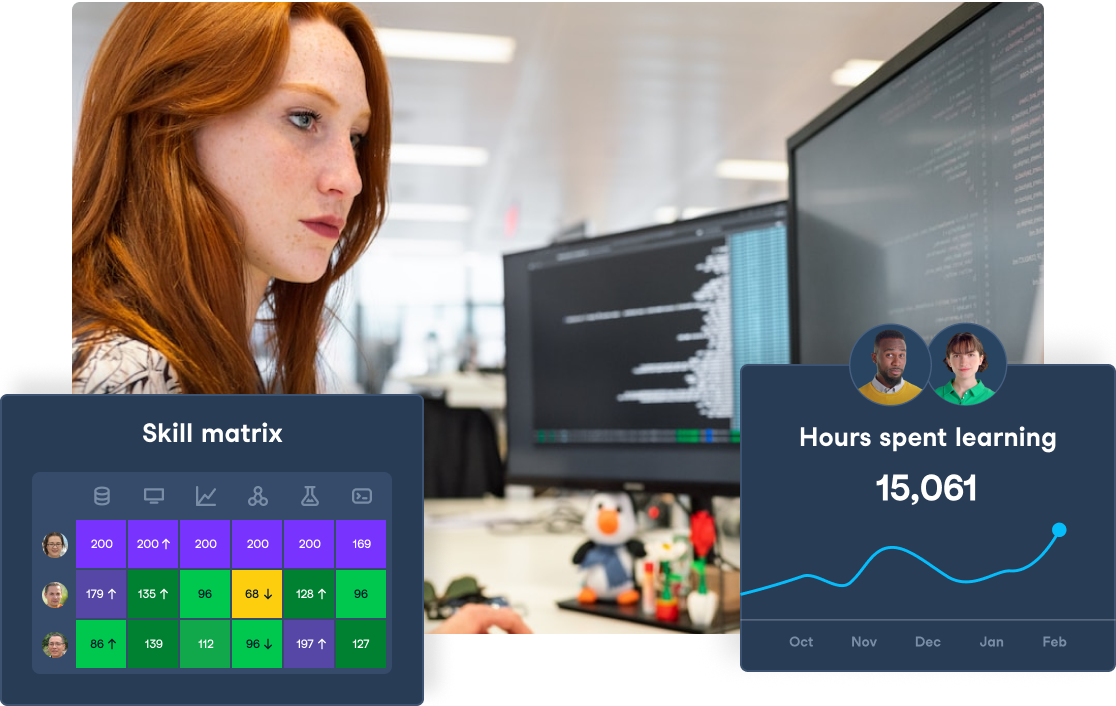
Conclusion
Learning AI is a rewarding pursuit that opens doors to a world of innovative technologies and exciting career opportunities. The knowledge and expertise gained through this process go beyond textbooks and lectures. It involves a dynamic cycle of learning, applying, experimenting, and improving. Embracing a hands-on approach, particularly through courses and AI projects, accelerates learning and cultivates essential skills in problem-solving, critical thinking, and creativity.
If you’re just starting out on your AI learning journey, we’ve outlined loads of helpful resources to help you get started, as well as an example learning plan for some of the key themes you’ll need to master on your way to become proficient in artificial intelligence. Get started today with our Understanding AI Course.

Adel is a Data Science educator, speaker, and VP of Media at DataCamp. Adel has released various courses and live training on data analysis, machine learning, and data engineering. He is passionate about spreading data skills and data literacy throughout organizations and the intersection of technology and society. He has an MSc in Data Science and Business Analytics. In his free time, you can find him hanging out with his cat Louis.

A senior editor in the AI and edtech space. Committed to exploring data and AI trends.
FAQs
How long does it take to learn AI?
The time it takes to learn AI depends on the route you take. If you choose a self-taught route, it can take several months to a year or more to gain a solid understanding of AI concepts, programming languages such as Python, mathematics, and various machine learning algorithms through self-study. Pursuing a formal education in computer science, data science, or related fields typically takes around three to four years to complete.
Why should I learn Artificial Intelligence right now?
Learning AI is highly beneficial as it is a fast-growing field with high-paying jobs and intellectually challenging work. The demand for AI skills is skyrocketing, and the projected AI market size growth between 2021 and 2030 is significant.
Who can benefit from learning AI?
Everyone can benefit from learning AI within their professional or personal lives. AI is transforming the way humans carry out tasks, solve problems and make decisions. Even if you are not invovled in roles such as software engineering, data analysis or research, understanding basic AI conepts will help you make sense of current and future advancements in the world of AI.
Is AI difficult to learn?
Learning AI can be challenging, but with dedication and a strategic approach, it is an achievable goal. AI is a broad field with various subtopics, and the depth of understanding required may vary depending on your specific goals. While the learning curve can be steep, there are numerous resources, courses, and communities available to support your AI learning journey. Consistency, practice, and a willingness to continuously learn and adapt are key to mastering AI.
What skills should I develop to learn AI?
To master AI, you'll need to develop skills in statistics, mathematics (such as linear algebra and probability), programming (Python or R), data structures, data manipulation (using libraries like pandas), data science, machine learning, and deep learning.
Which AI tools and packages should I learn?
Python and R are popular languages for AI, and learning libraries like pandas, NumPy, Scikit-Learn, PyCaret, PyTorch, and Keras can be valuable. These libraries offer functionalities for data manipulation, statistical analysis, machine learning, and deep learning. Additionally, exploring commercially available APIs and packages like Hugging Face's transformers and accelerate can be beneficial.
How can I stay updated with the latest trends in AI?
AI is a rapidly evolving field, so it's important to keep learning and stay updated. Follow AI thought leaders on social media, read research papers, listen to AI-related podcasts, and attend industry events. By staying informed, you can keep up with new advancements and trends in AI.
Can I find a job in AI without a degree?
While a degree can be beneficial, it's not the only pathway to a career in AI. Continuously learn about the field, develop a portfolio of AI projects, tailor your resume for applicant tracking systems (ATS), and engage with the AI community. Sharing your work, ideas, and passion on platforms like LinkedIn and Twitter can attract the attention of hiring managers.
How can I leverage AI tools effectively in my job?
Mastering AI tools in business goes beyond understanding the technology. It's about knowing how to leverage them effectively to drive success. By learning, applying, and refining their use, you can stay ahead of the curve in the AI-driven business world. Continuously learn, experiment, and adapt your approach to maximize the benefits of AI tools in your role and business.
What are some common challenges faced when learning AI?
Common challenges include understanding complex mathematical concepts, keeping up with rapidly evolving technologies, and finding reliable resources. Practical implementation can also be daunting if one lacks experience in programming and data manipulation.
How important is it to specialize in a subfield of AI when starting out?
While having a broad understanding of AI is beneficial, specialization can be important depending on career goals. Specializing allows for deeper expertise in areas like natural language processing or computer vision, which can be advantageous for certain roles.
Can someone transition to a career in AI from a non-technical background? How?
Yes, transitioning is possible, though it might require more effort. Start by learning programming basics, particularly Python, and gradually build up skills in data science, machine learning, and AI. DataCamp courses, bootcamps, and community engagement can facilitate this transition




